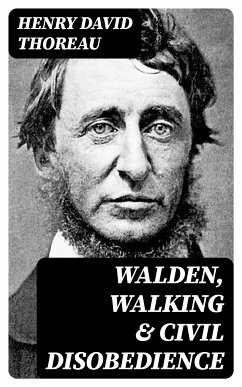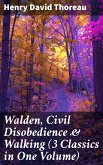In "Walden, Walking & Civil Disobedience," Henry David Thoreau artfully weaves together philosophical musings and practical observations derived from his transformative experience living in a cabin near Walden Pond. The book, structured in a reflective style, captures Thoreau's journey of self-sufficiency and his profound insights on nature, society, and the individual's relationship with government. Through lyrical prose, Thoreau explores themes of simplicity, solitude, and civil resistance, elevating personal experience into a broader dialogue about social justice and moral integrity in an increasingly industrialized world. Thoreau, a key figure in the Transcendentalist movement, was deeply influenced by the natural beauty of his surroundings as well as the socio-political currents of 19th-century America. His time at Walden was both an experiment in minimalist living and a response to rampant materialism. Thoreau's passionate stance against slavery and his advocacy for nonviolent resistance stem from his belief in personal conscience, which forms a cornerstone of his philosophy. This classic work is a must-read for anyone seeking to understand the interplay between nature, self-reliance, and morality. "Walden, Walking & Civil Disobedience" invites readers to contemplate their own lives in relation to the larger societal framework, challenging them to consider the ethical implications of their actions.
Dieser Download kann aus rechtlichen Gründen nur mit Rechnungsadresse in A, B, BG, CY, CZ, D, DK, EW, E, FIN, F, GR, H, IRL, I, LT, L, LR, M, NL, PL, P, R, S, SLO, SK ausgeliefert werden.









